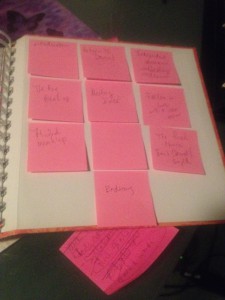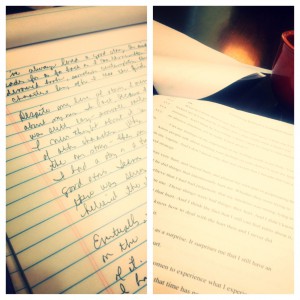I can’t lie. I shimmied when I received Tayari’s invitation to the blog tour. I’ve admired and appreciated her since the release of her wonderful book, Silver Sparrow. I met her via Twitter, and because she was so warm and engaging, I bought the book and attended her book signing in Athens, Georgia. Gracious and welcoming, she shared her wisdom, time and friends with me that day.
So the purpose of this blog tour is to showcase the ways writers engage in the writing process. To that end, bloggers answer four questions and pass the baton to two others. The questions and my responses are below:
 What are you working on?
What are you working on?
I’m in the early stages of a short story. I’ve not written very many of those, and in fact, my last attempt was years ago. I’m also 30,000 words into a novel, but I’ve spent time away from it and I’m just about ready to start over. I need to rework the central conflict and stop making life so easy for my protagonist. I can’t help it though. It’s my first time writing a novel and I want things to work out for her in the end (spoiler alert?).
Fiction is a major departure for me even though I’ve always wanted to write it. I have lots of ideas to explore, most of which are grounded in compassion and love.
How does your work differ from others’ work in the same genre?
Generally I write because I need to express an idea, document an event, or think through something. Rather than writing for public recognition, I write to recognize myself. To that end, I usually write personal narratives and the occasional brief essay. I’ve not modeled my work after anyone, nor have I sought to distinguish myself from anyone. I seek to understand and be true to myself on the page.
Recently I began reading short stories penned by a well-respected writer. I couldn’t finish them because they were simply too depressing. The men were abusive and abrasive. The women were abused and wholly devoid of agency. Horrific circumstances happen in real life, but so does fighting back. So does healing. This collection is not representative of short stories, but as I move into fiction, I’m clear I want to tell stories that uplift. I want us to imagine and live lives of joy. I want to write stories that help us do that.
Why do you write what you do?
I write because I am moved to do so. Sometimes my heart is full and I want to share that feeling. Sometimes I completely disagree with the prevailing thought and I want to provide an alternative point of view. These two ideas also undergird the writing I have planned in the near future. I believe in peace. I believe in restoration over retribution. I want to challenge people to reconsider the ways we treat people individually, societally, institutionally. I write to make us think, feel. I write to confirm triumphs of the human spirit.
 How does your writing process work?
How does your writing process work?
If I already have ideas about what I want to say, I sit at the computer and type stream-of-consciousness. It pours out pretty quickly and do not censor as I go.
I write as much as I can, as fast as I can, placing {insert _____ here} or XXXX whenever I am missing a word or detail. I don’t search for anything midstream. I go until I’ve expressed everything I can.
It’s out of order. It’s repetitive. It’s a mess.
I reread and elaborate where it makes sense, and move sentences and whole paragraphs from place to place. If it’s a longer work, I print it out with line numbers and physically cut out paragraphs and sections, moving them as I go. Once I feel like most of the ideas are on the page and more or less in the right place, I fill in missing details. Crafting (poetics) is the last step.
But what if I don’t really know where I stand? Or I’m not really sure where I’m going? That’s when it’s pen to paper. Longhand helps me think. I write until I have sense of where I’m going. Then I either type what I’ve written, and revise it as needed, or I start a new brain dump on the computer.
Sometimes I’m stuck and need a push to keep going. At those times I find a relevant or provocative quote and write a response, or I type a question a friend or editor might ask about the work and answer it. Somewhere in there is the catalyst I need to continue my work.
There’s more to say about preparing the space, carving out time to write and strategies I use to focus. Maybe I’ll tweet about them…
So who’s got next? Stacia and Joshunda.
Stacia crafts gorgeous prose about life – hers and society at large. She recently finished a weeklong stint blogging at the Washington Post and she has a few social media outlets. You can always find her here.
Joshunda is a prolific author and journalist. Every time I turn around she has a thoughtful piece in yet another publication. She has an inspirational Tumblr and her main home on the web is here.
